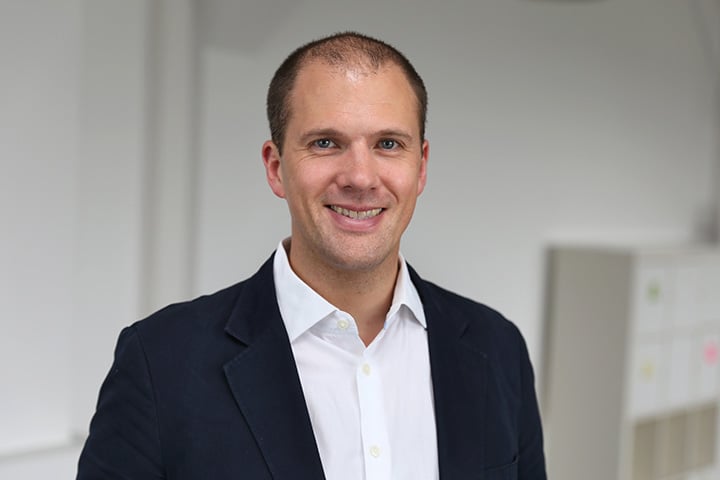Tecan uses cookies to improve our website. By continuing to browse our website, you accept our cookie policy.
Tecan uses cookies to improve our website. By continuing to browse our website, you accept our cookie policy.

In a post-pandemic world, the need for real-time and remote connectivity is more crucial than ever. Today’s laboratory equipment and analyzers are capable of generating more data than ever before, creating new challenges for data processing and analysis. Recognizing this challenge back in 2013, Labforward began developing software solutions capable of interfacing directly with a diverse range of laboratory instruments.
The idea behind Labforward began when co-founders Simon Bungers and Florian Hauer were pursuing their PhDs at the Max Planck Institute in Göttingen, Germany. The duo saw the need to circumvent the paper trails left behind by scientists, while providing a neat, searchable data repository for researchers within the lab. Labforward’s central concept is to empower users to connect all of their lab data – including instrument data – to a central platform, accessible via a simple interface, enabling real-time and remote electronic data capture. Simon explained: “Research laboratories are at the cusp of innovation, but it’s quite clear that, in many cases, their data management is many years behind. There is a lot of room for improvement, and we want to make the work of scientists easier by connecting everything in the laboratory: the data, the devices and the people.” “Each laboratory has its own unique set of processes, platforms, software packages and analyses to perform. Our strategy is to provide a digital toolbox compatible with different systems for varied applications, which we can help adapt to diverse lab backgrounds. We are the enabler, connecting all the different laboratory components to help improve data flow. We’re developing a broad set of extensions to suit specific equipment or applications, and labs can customize the base solutions with the functionalities they require. Our open philosophy gives us an edge over more conventional solutions, and makes us a reliable partner for helping develop labs of the future, befitting the Lab 4.0 age.”
 Florian Hauer
Florian Hauer
 Simon Bungers
Simon Bungers
Delving into their continuously evolving strategy for Labforward, Florian added: “Historically, we have worked with small and mid-sized research companies, but we have an ever-increasing number of large customers in the pharma, chemistry and material sciences sectors. These global players often have very specific needs, with long-established workflows operating at numerous sites around the world, and so we have started to integrate third-party solutions directly into our platform to offer increased functionality. When engaging in such partnerships, we look for products that have a strong reputation in the field, and are commonly found in labs globally, and this naturally led to our collaboration with Tecan. Crucially, Tecan also shares our outlook in terms of openness, understanding the importance of connecting various datasets from different devices.”
It allows users to quickly and easily design multi-well experiments, document sample preparation steps and execute assay protocols.
Florian continued: “A large proportion of life sciences research and development labs – from academia to big pharma – use microplate readers, and Tecan’s systems are very popular due to their versatility. However, many of these labs do not have automated liquid handling platforms, and so set up their experiments manually with single- or multichannel pipettes. Diligent documentation of sample and assay preparation, as well as measurement settings, is obviously crucial for experiments to be error-free and repeatable, but this can be both labor intensive and time consuming when performed manually, making effective experimental planning and data capture a lot harder to achieve. We therefore set out to develop a solution that enabled efficient planning and accurate execution of manually performed microplate reader-based experiments.”
Labforward’s software engineers worked closely with the Tecan product management team to fulfill this vision, and the Well Plate Templates app was released in 2020. This innovative app integrates Tecan’s Magellan™ reader control and data analysis software with Labfolder ELN to provide comprehensive data capture and allow users to access key functionalities of the Tecan microplate readers, including the Spark®, Infinite® 200 PRO, Sunrise™ and Infinite F50. It allows users to quickly and easily design multi-well experiments, document sample preparation steps and execute assay protocols directly from the app interface, as well as recording and managing their experimental data. This completely replaces ‘pen and paper’ solutions to save time and ensure reliable documenting of experiments, increasing process security. “Our app has received very positive feedback from the first wave of customers,” Simon continued. “We have simultaneously been testing and refining the integration of Tecan’s detection devices with our lab execution platform, Laboperator. We are now collaborating with Tecan to extend the capabilities of our lab automation platform to optimize bioprocessing experiments using the company’s readers and liquid handling systems in a closed-loop system. We look forward to tackling even more complex topics very soon,” Simon concluded.
To find out more about Tecan’s Magellan software, visit lifesciences.tecan.com/software-magellan
To learn more about Labforward, go to www.labforward.io